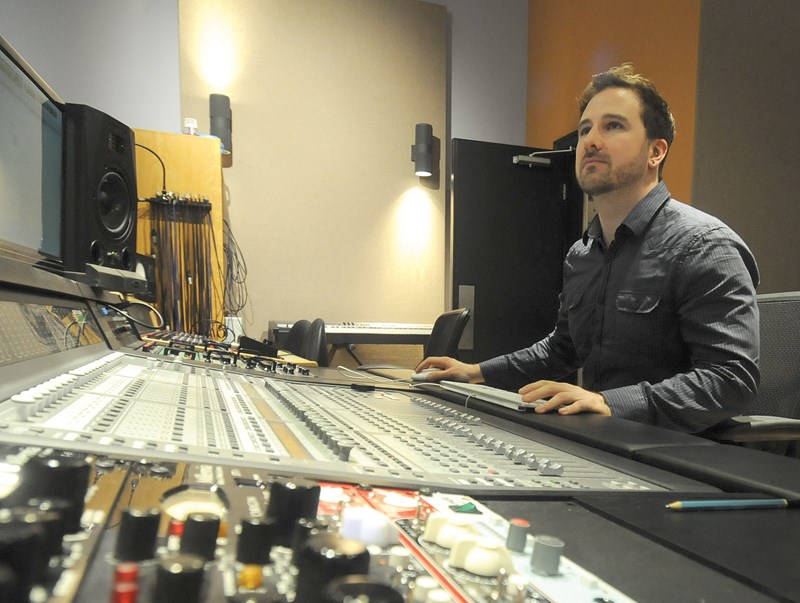Brian Watson was:
A) Speaking from the heart.
B) Full of it.
Those were the options facing Tony Rudner as he decided on the future of his “dream studio,” the Harbourside Institute of Technology.
The spacious studio started its life as a destination for bands hoping to record a hit. But after hearing from a host of young, aspiring record producers, Rudner realized there was another market he could tap into.
“The idea was either the school or the studio would take over,” Rudner says.
Harbourside eventually became “almost non-existent” as a studio, instead turning into a school staffed by Rudner’s music industry colleagues, including Brian Watson.
Back in his Carson Graham days, Watson wanted to be “the next Ringo Starr.”
Despite being “very expendable” as a drummer, Watson inked a deal with indy label Criminal Records.
His fledgling career was aborted after a grad party car crash.
It’s not something Watson dwells on, only noting there was “beer involved” and a collision that broke his lower back.
With his drumsticks tucked away, Watson found himself “on the other side of the desk,” booking bands at the Town Pump and Club Soda.
“If I couldn’t be in a band, I was going to bite on like a pit bull and figure out how to be in the music industry.”
His parents realized just how serious he was when he took the water bed out of his room, plucked the black velvet Pink Floyd posters from his walls, installed his own phone line and dragged in a $25 teacher’s desk.
Watson was officially a music manager.
He was just out of high school when he got a gig with Vancouver talent agency Feldman and Associates, where he was in the right demographic at the right time.
The agency was struggling to figure out what to do with acts that appealed to college kids like Sarah McLachlan and the Tragically Hip.
He must have impressed someone, because Watson quickly moved through the ranks, working with the company’s national director of touring.
“Thinking I was all that and a bag of chips, I left,” he explains.
After “having a great ol’ time” working for giants like Virgin Records and EMI, Watson decided the time was right to plant his own flag.
He wanted to do something a little less corporate, something that didn’t require “marketing by the numbers.”
Watson formed Maximum Music Group, immediately signing Metalwood, an electric jazz quartet that won a Juno in 1998 for best contemporary jazz album.
Watson’s company leased a downtown Vancouver office with high ceilings, red brick, and an air hockey table where the receptionist was supposed to be.
But somewhere in Massachusetts, the beta version of Napster was about to go online – a peer to peer file sharing service that would pull millions of music lovers out of record stores and plunk them in front of computer monitors.
“Everybody went to work from home,” Watson recalls.
While Watson was regrouping, Rudner was slowly but surely attracting more and more students to Harbourside. The key was that it wasn’t a performing arts school. It was a trade school.
“It was a school of geeks for geeks,” Watson says.
Watson had gotten a taste for the academic side of things as part of a Capilano University business arts and administration advisory committee when Rudner gave him a call.
The last time Watson had been to Harbourside “it was literally a studio with a set of offices.”
But Rudner had swapped the offices for a classroom, turning the place into a high-tech one-room schoolhouse.
“Not until Brian Watson came along was I comfortable and I knew that we were on the right track,” Rudner says.
Students could now learn about the music business alongside audio engineering and music production.
But Watson had a sense the school could be even bigger.
“He kept putting a bug in my ear about what we can do with the school and how it can expand,” Rudner recalls.
Watson admits to pestering Rudner for a while, recalling Rudner eventually telling him: “You’re either speaking from the heart or you’re the best DBO guy I’ve ever met.”
DBO stands for Director of B.S. Operations, Watson explains.
While Watson wasn’t “highly technical,” (by his own admission, the only devices Watson can operate in the studio are the lights and an eBay-purchased flux capacitor), Rudner noted Watson’s passion for the school. The students loved him.
“And he loved it,” Rudner says.
Rudner was also looking to devote more of his time to music, hoping to finish an album more than three years in the making with guitarist Andreas Shuld.
With those considerations in mind, Rudner emailed SAE Institute, an international conglomerate with 54 media schools around the world.
While there were initial concerns about the school’s size and location, SAE warmed to the deal over a 19-month negotiation period.
Rudner’s requirement was simple: the staff needed to stay on, including Watson as campus director.
“They said, ‘No problem, Brian is the guy,’” Rudner recalls.
Rudner was tight-lipped on the sales figures, only saying SAE paid “what it’s worth.”
The focus is on sustained growth, says Watson, who likens the situation to playing in a sandbox with new toys.
The school should stay on the North Shore for the next two years, and considering North Vancouver’s burgeoning status as a media centre, Watson says he’s hopeful the school can “plant our roots here.”
As a true child of 1980s pop music, Watson offers optimism reminiscent of pop group Timbuk 3.
“The future looks bright,” he says. “We’ve got to wear shades.”
The deal became official May 1.



